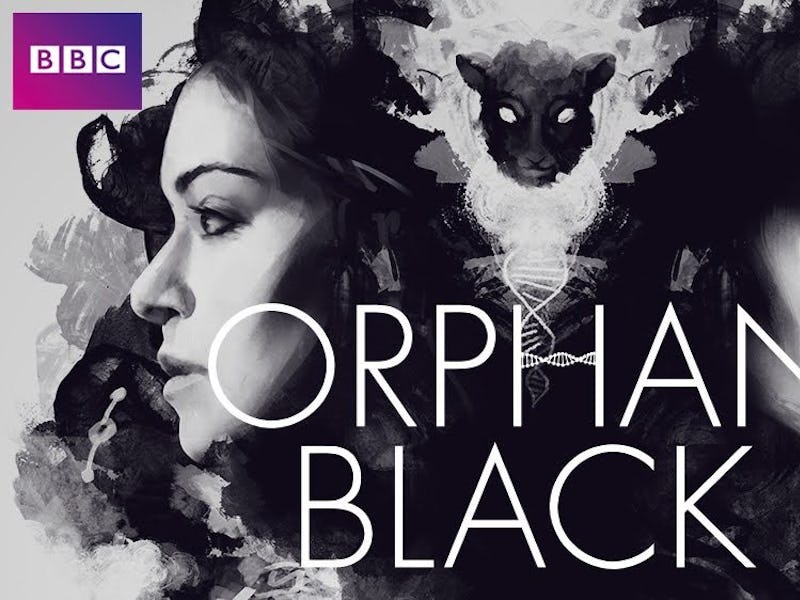'Orphan Black' Ratchets Up The Argument On Copyrighted Life To A Terrifying Extreme
Like all good sci-fi, 'Orphan Black' takes the current science and law to its terrifying extreme.

This article contains spoilers.
Orphan Black concluded the fourth season last night, in its darkest, most dramatic finale to date. BBCAmerica also confirmed yesterday that the show’s fifth season would be its last; the creators have said before they were aiming for five seasons, so at least we can be assured the story will wrap up the way it was intended to. After the fallout of last night’s episode, it looks like this final season will re-focus on the show’s earliest questions of personhood — can the clones own themselves?
All along, the clones have been fighting for the freedom to live their lives, pursued by a series of nefarious agencies seeking to harm, exploit, or eliminate them. But it now looks as if it will all come back to a Season 1 reveal that the clones are patented property: they are legally not people.
Rachel was revealed to be an even more ruthless villain than we previously thought, pursuing her goal of expanding human cloning to produce “wholly patented, farmed and monitored lab animals.” Her speech to the mysterious Board of Neolution was chilling enough, even without this line: “We operate in countries where human cloning is not illegal, where our corporation supersedes their citizenship, their personhood.”
The words “corporation” and “personhood” might draw to mind the current legal battles in the U.S. involving the rights of corporations in areas like religious freedom. It may also recall the legal battles over fetal personhood. Both these debates threaten to reduce the autonomy of the living, breathing human individuals we understand to be people.
Orphan Black has always confronted the ethics of the science it portrays, most often using Cosima as its mouthpiece for a fierce defense of individual autonomy. Who can forget her powerful proclamation of, “my body. I’m the science,” when she thought Delphine was hiding details of her own biology from her? Orphan Black is abundantly clear in portraying the clones as true individuals, but the issue of patented humans is, like all good sci-fi, an extreme conclusion to the progress of science and law.
For centuries, living organisms were considered a product of nature, and thus ineligible for patent or copyright claims. This began to change in the late 20th century with the growing field of genetic modification. In 1980, the landmark Supreme Court case Diamond v. Chakrabarty changed that, granting a patent for a strain of genetically modified bacterium. This opened the door for what we now call “biological patents”.
Since then, patents have been granted for animal and plant life. The debate over patented GMO crops is one that you might be most familiar with. In this case, the ethical debate focuses more on the business practices of corporations and the harm that patents cause to independent farmers.
However, patents on human life do exist, and this is where the ethics get really dicey. Corporations have successfully patented human genes, cell lines, and tissues with the argument that their isolation and production in a lab makes them a human invention. Another landmark legal battle in 1990 ruled that an ex-cancer patient had no right to the science or profits derived from tissue removed from his body.
Generally, these patented materials are used in developing gene therapies or lab grown tissues, with the ultimate goal of curing or healing certain diseases and injuries. Those who argue against patenting human biological material, such as the Council for Responsible Genetics, say that financial exploitation is one of the main concerns. As with pharmaceuticals, patents will artificially inflate the cost of gene therapy and other cure. Proponents say it is necessary to protect investment and allow further innovation.
Science is still a long way from fully cloning humans; according to the National Human Genome Research Institute, cloning humans and other primates is technically more difficult than other mammals, given to differences in cell structure. It is also almost unanimously considered unethical, and overall gene cloning remains very well regulated.
For all the fanfare surrounding Dolly in 1996, animal cloning has been going on quietly and regularly ever since, and that has lead to some other interesting legal battles. So far, individual cloned animals are owned just the same as a natural born animal and have not been individually patented. Horses and cattle are two domestic species that are most routinely cloned, usually for breeding purposes. Most clone horses are an effort to replicate a particularly successful competition horse, and if fact a surprising number of clones are competing in equestrian sports today. Thus far, breed registries have banned the registration of cloned animals, thus significantly reducing their perceived value. However, a current ongoing case may soon change that.
Fortunately, we aren’t likely to see patented humans any time soon, but the topic is an increasingly relevant one due to the fast advances in science and the legal precedents that have been set. Orphan Black plays on our pop culture understanding of cloning — identical fully formed individuals — but real cloning is much more prevalent and commonplace than we often realize.
We now know that legal personhood is going to be the final question that Orphan Black tackles in its last season. While it’s unlikely that the show will turn into a courtroom drama, Sarah and her sisters will be taking a stand for themselves – and their science.